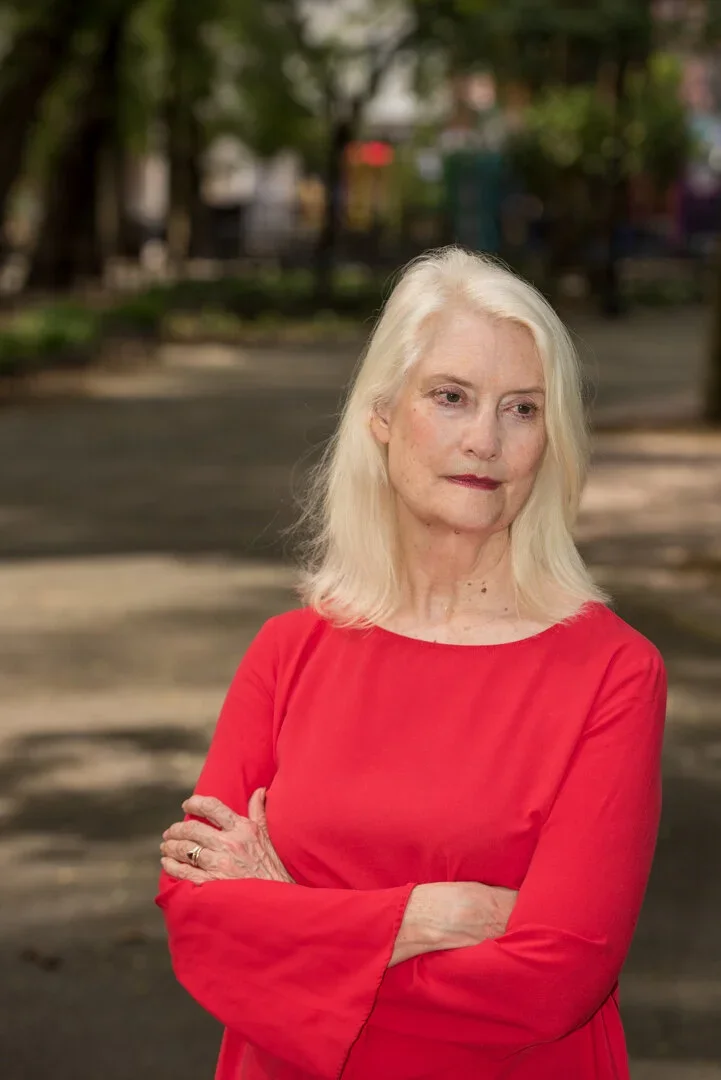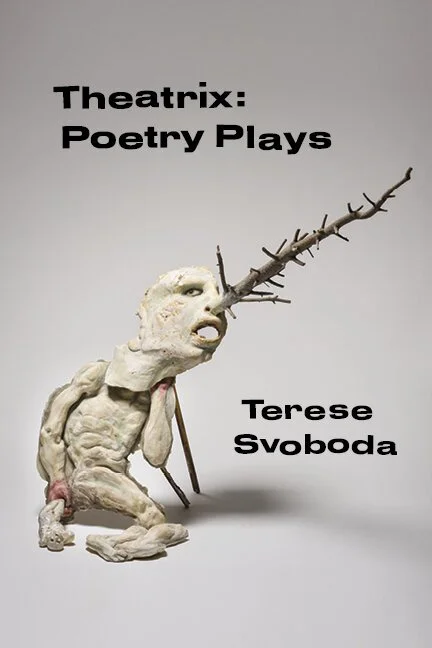Terese Svoboda
TERESE SVOBODA is the author of All Aberration, Laughing Africa, Treason, Mere Mortals, and Weapons Grade, and the chapbook, Dogs Are Not Cats. A recent Guggenheim recipient, she has won the Iowa Prize in Poetry, the Cecil Hemley Award and the Emily Dickinson Prize from the Poetry Society of America, and a New York Foundation for the Arts grant. A fellow at Bellagio, Bogliasco, Yaddo, the James Merrill House, MacDowell, and the NEH, she also received a PEN/Columbia fellowship to translate Nuer song. She has taught at Williams, Columbia’s School of the Arts, Southampton/Stony Brook, the New School, San Francisco State, William and Mary, Fairleigh Dickinson, Sarah Lawrence, Bennington, Atlantic Center for the Arts, and the Universities of Tampa, Miami, Fordham, Wichita State, and Hawaii, in St. Petersburg and Kenya for the Summer Literary Programs, and has held the McGee Professorship at Davidson College. She traveled to Kenya to talk to Somali refugees for the University of Iowa’s International Writing Program. The author of six books of fiction, a memoir, and a book of translation from the Nuer, she will publish a biography of the radical poet Lola Ridge in 2016.
Borrowing from Greek tragedy, Shakespeare, and absurdist theater in equal measure, Theatrix: Poetry Plays is a tour de force collection that explodes our notion of the fourth wall to include deconstructionist, experimental poetics and the vernacular (from trigger warnings to congressional hearings) of our times.
Whether imagining a "skein of scenes" between amorous cutlery, or "States of Information War," Svoboda defies all authoritarian structures (paternal, religious, directorial) through a daring performative text that excavates the very "root of spectacle" — spectators, and readers, themselves. In a staged world where "even the building is burning," and the various forms of perspectival chaos include the POV of blood, how can any dramatic representation cohere? Svoboda offers not an answer but a challenge: to think "the unthinkable." Not since Beckett has an existential soliloquy defined the task before us with such bravura: the way forward is brilliantly, bracingly clear. —Virginia Konchan, author of Any God Will Do
What writing could be more attuned to our Kavanaugh-sodden, post-post-industrial moment than these mordant and eerie vignettes from Terese Svoboda? Continuing her distinguished record of accomplishment in prose and verse, Theatrix offers poetry in play and at play, darting in and out of domestic scenes (including a spoon & fork’s poignant interplay), ruined shopping malls, and Shakespearian denouements. Throughout, her commitment to truth-telling burns brightly, whether in feminist retracings of patriarchal wreckage or in resolute acknowledgment of the knottiness of language, its dense opacities and scintillas of insight. Svoboda writes in “Five Acts” of “the aisle dark but for the glinting”; these thrilling poems are often ominous, but lit from within by a fierce and compassionate intelligence. — John Beer, author of The Waste Land and Other Poems
Sinewy is the word that comes to mind when considering Svoboda’s aesthetics. Sinewy is neither loose nor stiff, but taut, flexible, adaptable. Theatrix is sinewy and so much more. Svoboda’s poetics are refreshingly not burdened by mono-topicality, unitary “voice”, or throwaway experimentalism. There’s maximum ingenuity to every single poem. The multivalent vocabilities deployed are arrestingly artful and scintillatingly athletic. Thematics be gone! Theatrix is for swift thinkers who crave raw word acts over mannered narratives. — Rodrigo Toscano, author of In Range
“Terese Svoboda is one of those writers you would be tempted to read regardless of the setting or the period or the plot or even the genre.” — Bloomsbury Review
THEATRIX: POETRY PLAYS BY TERESE SVOBODA $20.00
What a cause for celebration: an extended visit to Terese Svoboda’s expansive and piercing vision, in which curiosity collides with critique and sparks wisdom, ignites wonder.
The unsettling dynamics of family, the anxieties of global politics, and the surprising encounters with the architecture of everyday life shape “the membrane of lived moments” of this fierce and formidable book.
When the Next Big War Blows Down the Valley may be a place where “every word from everyone hurts,” but take solace, dear reader, Svoboda will turn each ache into an exquisite tune. —Rigoberto González
Praise for the poetry of Terese Svoboda
Terese Svoboda’s poetry is at once so remarkably precise and utterly strange I find my mind marrying her vision with vertigo and delight. Her Selected and New is not just a treasure trove: it’s a must-have for any serious reader of poetry. Dive in! I’ll be waiting for you in the “Marriage Boat” where Svoboda’s gulls scream, “Flesh! Flesh!” —Cate Marvin
There are writers you would be tempted to read regardless of the setting or the period or the plot or even the genre. … Terese Svoboda is one of those writers. — Bloomsbury Review
Language at the edge of utterance, utterly original. — Eleanor Wilner
These poems take you on a wild ride, fast and dangerous, but always in control — Tom Lux
All Aberration ... is refreshingly unfashionable, strikingly written, and suffused with toughness and integrity. — Robert Levy, Prairie Schooner
For readers who prefer the chill of a dry martini. — Library Journal.
Ironical, tough-minded, refusing the “treason” of our sad human trafficking in love. — Carol Muske-Dukes, L.A. Times
Svoboda’s poems are as haunting as they are funny, as pleasurable as they are powerful. —Publisher’s Weekly
WHEN THE NEXT BIG WAR BLOWS DOWN THE VALLEY: SELECTED AND NEW POEMS BY TEREZE SCOVODA $25.00
Poems from When the Next Big War Blows Down the Valley: Selected and New Poems
Fuel Adieu!
Once, living as a seal,
I leapt the margins of waves
into sunsets made green by lichen.
You buy that? The tiny plants,
the angle of the sun, the seal?
Atlantic City tidies itself
into the margins of waves
nobody watches or they’d
miss their dice roll. If you
lichen on Facebook the box
unlichens, living living living
on margins really singular
for the green electricity
that meets its demand, the seal
no-friended on account of
gamboling on lichen — it could be
algae without the fuel —
and myself an impersonator,
a drop of oil in the shape
of the surface gasping
for what I can get,
a sunset, a wave, a lorgnette
to see the cards being dealt.
I can swim into the sunset
anthropomorphized or not,
the margins set regardless
of perspective, the seal
sunk, the lichen changed
into phosphorescence
as if a wave goodbye.
Adieu! the seal says with its tail,
an extension of its waist. The waves
okay that, the sun likes.
Bridge, Mother
Mother burns on the other side of the bridge.
Mother burns the bridge and is safe on the other side.
Mother is not on the bridge when it burns.
When Mother says burn, the bridge burns.
We can’t get to the other side,
the bridge is burning.
Mother is the bridge that we burn.
She is how we get to the other side.
We can’t burn the bridge without her.
Mother burns and we burn, bridge or no bridge.
She is the other side.
Nothing burns the bridge, and then it burns.
All The Livelong Day
The train loses track.
Crime, your sweetheart, makes me
look good anyway. I’m outstretched,
the girl given. Who tied my bonds?
This is a New Year,
people swig
on the sidelines, people
turn away.
Gawd, I say.
There’s a couple more like us,
they come out of my body while
I wait, choo-choo,
time
hugging the course, the bend gravy,
the bed heroic, someone sawing
at the bonds,
cinders swirling at
a cow caught on the catcher,
bearing down.
O fingers, faster.
No one will remember
my name or yours, only
the humming, the talk-
into-the-distance song, and Crime’s,
ticketless
all the livelong day.



